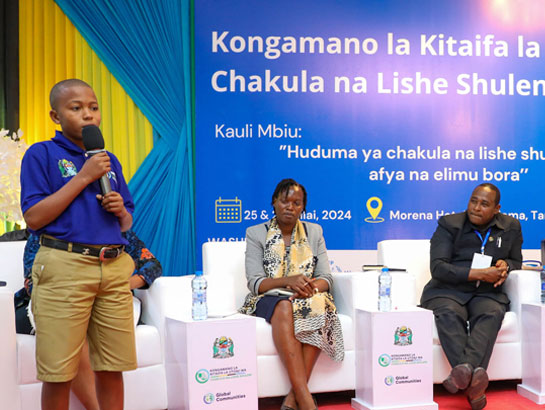Tanzania has committed to providing free primary school education, eliminating the need for parents to pay for schooling of their children. However, parents are expected to contribute to school meals based on agreements made at the school level. These arrangements vary depending on the school’s resources and the local community’s economic conditions.
On July 25-26, the National School Feeding Conference brought together a diverse group of stakeholders including teachers, students, researchers, international organizations, policymakers, civil society organizations, and private sector representatives in Dodoma, Tanzania. The conference aimed to improve awareness, share best practices, and foster collaboration among partners on the critical subject of school feeding. The conference was officially opened by the Minister of Education, Professor Adolf Mkenda.
Penina Muoki (PhD), Program Manager at HarvestPlus attended as panelist and spotlighted the work that HarvestPlus Tanzania implements. Her recommendations include integration of biofortified crops in school meals and fostering private sector engagement to strengthen the supply chain for healthy diet to schools.
The discussions aligned with HarvestPlus’ work in Tanzania through the Advancing Availability of Biofortified Foods for Institutional Markets project, funded by the Rockefeller Foundation through AGRA. This project emphasizes value chain development for biofortified iron and zinc enriched beans and vitamin A maize, as well as promoting home-grown school feeding. The three-year program aims to reach 400,000 schoolchildren and strengthen the ecosystem for sustainable delivery of biofortified crops, particularly vitamin A maize and iron and zinc enriched beans, to school feeding programs in Tanzania.
At the conference, stakeholders shared various initiatives to ensure food availability in schools, including establishing school gardens that contribute diverse foods to school meals. These gardens are primarily managed by students as part of “Elimu ya Kijitengemea” (education for self-reliance), a Ministry of Education initiative launched in 2023.
The conference opened the doors to strengthen implementing of the project by collaborating with multiple stakeholders, whose joint efforts are crucial for sustainable school meals that utilize locally produced staple foods.
The conference also highlighted significant initiatives in value chain development, focusing on strengthening the availability of early generation seeds, improving seed distribution and access, and establishing market linkages for seeds and grain. These efforts are designed to enhance the agricultural supply chain, ensuring farmers have access to high-quality seeds and efficient distribution channels for both seeds and crops. By improving seed access and creating robust market linkages, stakeholders aim to boost agricultural productivity and support farmers’ livelihoods.
The conference also highlighted the need to address dehulling, a maize preparation process that reduces nutrient content. Providing guidelines on this practice would help schools maintain the nutritional integrity of maize used in meals.
The conference emphasized the importance of strengthening policies to prohibit the sale of unhealthy foods in school canteens. Students often have access to high-energy foods that contribute to obesity, overweight, and other chronic diseases. By enforcing policies that restrict the sale of these foods, schools can promote healthier eating habits and improve student well-being.
Finally, the policy on school feeding needs to be reinforced to attract private sector participation, which is vital for its success. Engaging private sector partners can bring additional resources, expertise, and innovation to school feeding programs, enhancing their effectiveness and sustainability. By fostering collaboration between public and private stakeholders, schools can ensure that feeding initiatives are well-supported and achieve their intended outcomes.
